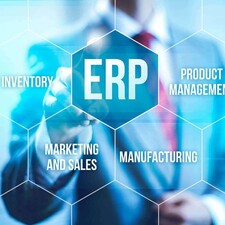Blog
Overcoming Common Objections During an ERP Selection Process

Summary
Objections and concerns are common during any ERP selection process. Even when the CEO and/or management team believe it's the right thing for the business, you still may encounter naysayers within the organization who are resistant to change for one reason or another. It's important to address these objections early on to ensure the organization can move forward efficiently and to avoid floundering or toxic negativity.
So what are some of the most common objections that might arise during the ERP selection process, and how might they be resolved? Much depends upon the nature of the organization, its industry, and its specific needs, of course, but here are seven of the most common objections raised during the ERP selection process:
Objection #1: Things are fine the way they are.
Reluctance to change is the most common objection in nearly every ERP selection process. It's hard to change when you're comfortable with the status quo, but many times, just because it's comfortable doesn't mean that it's efficient, strategic or helping the business. Many companies are limping along with hacked-together solutions, piecing together various functions, data and reports from countless different places, trying to make sense of it all, and often resorting to using intuition rather than data to make key decisions. This is no way to run a business.
There's a high price for inaction when it comes to outdated systems
Businesses succeed through calculated risks, and replacing an old, ineffective system with a strategic ERP is exactly the kind of risk that pays off in the long run, even if it means getting people out of their comfort zones.
Plus, there's pay a high price for inaction when it comes to operating with an outdated or inefficient system. Customers, vendors, employees and other stakeholders notice that you’re not investing in your IT capabilities because they experience issues at various points of your supply chain, whether it's late deliveries, slow response times, snafus with invoices, or inconsistent customer service.
Don't get intimidated by your ERP selection. Download this guide: The 7 Easy Steps to Selecting an ERP System
Objection #2: We do not have time for this right now.
You might have employees who see implementing ERP as a hassle, think it will take too long, or will distract from the core business. These are legitimate concerns and should be addressed and planned for.
there's never a perfect time for a big change
Remember that you have control over the timing of your ERP implementation. You can work with your ERP partner to reduce the impact on operations by scheduling it during your slow season or a time when it will be easiest to absorb the extra work. Be realistic in planning the timeline and make sure you have a backfill plan for the primary people who will serve on the implementation plan so that their work doesn't fall through the cracks.
Also know that there's never a perfect time for a big change. Deferring investment of time and capital until “a better time,” just puts off the inevitable. In the meantime, your current systems what edge will you lose to competitors and what damage will your ineffective systems cause?
Employees often have questions and concerns when they hear a new ERP is on the horizon. It's important to listen and respond to their concerns.
Objection #3: What if we lose our data?
During any ERP implementation with a reputable vendor, your data will be backed up and made available for your use during all phases of the process. This is done to ensure (1) that your data is protected during the migration process and (2) that your data remains available to you during every step of the changeover.
As you're looking at ERP vendors, ask about the specifics of data backup and migration. Understanding the process and protections should help alleviate these concerns.
Objection #4: We are too small for an ERP system.
If you think small and invest small, you’ll remain small.
The most successful and profitable manufacturing businesses, even small businesses with fewer than 25 employees, are already using ERP systems to work smarter. New developments in the ERP world such as cloud ERP, subscription / SaaS pricing models, mobile ERP and web-based ERP interfaces make it easier than even for small businesses to get started with their first ERP. Many software packages have license options for as few as 5 users.
Plus, just because you're small now doesn't mean you want to stay small forever. An ERP system can facilitate your growth and offer you competitive advantages against your rivals, now and in the future. If you think small and invest small, you’ll remain small.
Objection #5: We are unique we are not going to find an ERP system / vendor that is right for us.
You might be surprised. Some vendors, including abas ERP, specialize in software for manufacturers with unique or custom processes and products. These vendors sell ERP systems that are flexible and allow for customizations where you need them, from the way you manage inventory to reporting to production processes.
Begin by sending out an RFI (request for information) that explains exactly what you're looking for in an ERP partner. Explain your specific needs and the unique aspects of your company or processes, then ask questions to determine whether you and your ERP partner are a good fit. This fitting process is similar to hiring a new employee – you'll need to ask the right questions, listen carefully to the answers, and find the right partner for you.
How do ERP implementations succeed? Find out in this case study:
Objection #6: This is going to make my job harder.
Implementing an ERP and using it to its full capacity –< could create some extra work for employees, especially as they learn the new process. But the extra work will pay off in the long run with a more successful, efficient and competitive company. It will likely even make the company a better place to work. But at the outset of the project, it can be hard for the team to see the long term benefits. How do you overcome this objection?
A good ERP partner will work closely with you to drive an effective change management process in which your users (1) understand the reason for the change (2) are fully trained and ready for the new way of working and (3) are brought along in a way that respects your organization's unique culture.
Fear and resistance to change is common in any transformation initiative, and a partner like abas has brought countless global customers to a better, more efficient place through implementing ERP systems. We know the change isn't just about systems and processes, but also about people.
Regardless of which objections you encounter, it's important to listen to employee concerns, take them seriously, and take time to get everyone on board early in the process to ensure a smooth ERP implementation.
For more information on abas, take a look at our abas ERP Overview or take this Quiz, which will help you decide if your organization might benefit from an ERP system.


